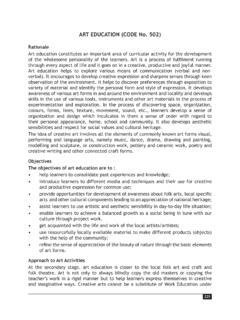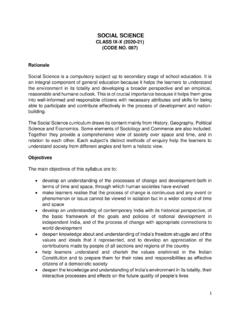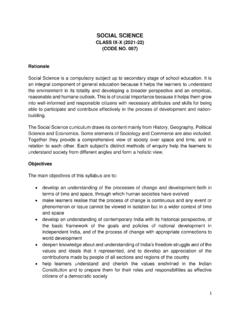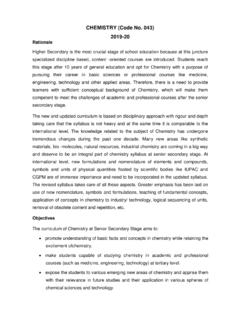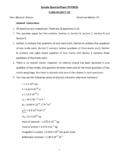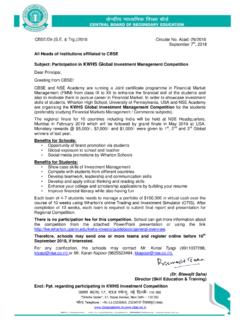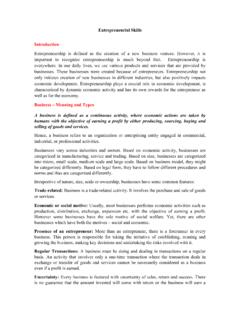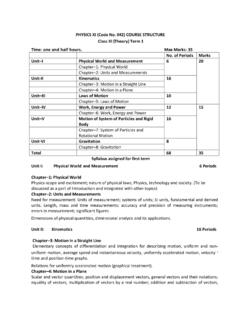Transcription of Financial Markets Management: XI
1 1 Financial Markets Management: XI Study Material 2 Preface NSE and CBSE Certification in Financial Markets (NCFM) NCFM is an online certification programme aimed at upgrading skills and building competency. The programme has a widespread reach with testing centres present at more than 154+ locations across the country. The NCFM offers certifications ranging from the Basic to Advanced. One can register for the NCFM through: Online mode by creating an online login id through the link Education > Certifications > Online Register / Enroll available on the website Offline mode by filling up registration form available on the website > Education > Certifications > Register for Certification Once registered, a candidate is allotted a unique NCFM registration number along with an online login id and can avail of facilities like SMS alerts, online payment, checking of test schedules, online enrolment, profile update etc.
2 Through their login id. 3 Contents Financial MARKET MANAGEMENT XI CHAPTER 1: Markets and Financial What is investment ? .. 9 What are various options available for investment ? .. 10 What is meant by a Stock Exchange? .. 12 What is a Depository? .. 13 What is meant by Securities ? .. 14 Regulator .. 15 Participants .. 16 Points to CHAPTER 2: Primary and Secondary What is the role of the Primary Market ? .. 18 Issue of Shares .. 18 What is meant by Issue price? .. 19 What is an Initial Public Offer (IPO)? .. 20 What is a Prospectus? .. 22 What is meant by Listing of Securities ? .. 23 What is SEBI s Role in an Issue? .. 23 Foreign Capital Issuance .. 24 Introduction .. 25 Stock Exchange .. 25 How is a depository similar to a bank?..26 Which are the depositories in India?
3 26 Stock Trading .. 28 What precautions must one take before investing in the stock Markets ? .. 31 Products in the Secondary Markets .. 33 Equity investment .. 34 Debt investment .. 36 Corporate Clearing & Settlement and What is a Book-closure/Record date?..41 What recourses are available to investor /client for redressing his grievances?..42 4 What is Arbitration?..42 What is an investor Protection Fund?..42 What is SEBI SCORES?..42 Points to CHAPTER 3: Financial Statement CONCEPTS & MODES OF is Simple Interest? .. 44 What is Compound Interest?.. 44 What is meant by the Time Value of Money? .. 46 How to go about systematically analyzing a company? .. 49 RATIO 58 Liquidity ratios: .. 58 Leverage/Capital structure Ratios: .. 60 Profitability ratios.
4 61 Illustration: .. 62 Points to CHAPTER 4: Mutual Funds Products and Introduction: ..65 Mutual Funds: Structure In Who Manages investor s Money?..68 Who is a Custodian?..69 What is the Role of the AMC?..69 What is an NFO?..70 What is the role of a registrar and transfer agents?..70 What is the procedure for investing in an NFO?..70 What are the investor s rights & obligations?..71 What are the different schemes offered by Mutual Funds? .. 72 Category wise funds .. 73 What are open ended and close ended funds? .. 73 What are Equity Oriented Funds? .. 74 Introduction .. 74 Equity Fund Definition .. 74 What is an Index Fund?..75 What are diversified large cap funds? ..76 What are midcap funds?..77 What are Sectoral Funds?..77 Other Equity Schemes.
5 77 Arbitrage Funds ..77 5 Multicap Funds ..77 Quant Funds ..77 International Equities Fund ..78 Growth ELSS ..79 Fund of Funds ..79 What is the importance of basic offer documents (SID and SAI)? .. 80 What is the key information document .. 80 What is NAV? .. 81 What are expenses incurred in relation to a scheme .. 83 What is Expense Ratio? .. 84 What is Portfolio Turnover?.. 84 How does AUM affect portfolio turnover? .. 85 How to analyse cash level in portfolios? .. 86 What are exit loads? .. 86 Points to CHAPTER 5: ETFs, Debt and Liquid Introduction to Exchange Traded Funds ..89 Salient Features .. 89 What are REITS .. 91 Why Gold ETF .. 91 Working .. 92 During New Fund Offer (NFO).
6 92 On an ongoing basis .. 92 Sovereign Gold Bonds .. 93 Details of Sovereign Gold Bonds .. 93 Market Making by APS .. 96 Creation units, Port Folio deposit and cash component .. 96 (an example) Salient Features .. 98 What is Interest Rate Risk? .. 99 What is Credit Risk? .. 100 How is a Debt Instrument Priced? .. 101 Debt Mutual Fund Schemes .. 105 Maturity Plans .. 105 6 Capital Protection Funds .. 105 Gilt Funds .. 105 Balanced Funds .. 105 MIPs .. 105 Child Benefit Plans .. 106 Salient features .. 106 Valuation of 107 Floating rate scheme .. 108 What is portfolio churning in liquid funds? .. 108 Stress testing of assets .. 108 Points to CHAPTER 6: Taxation and Capital gains taxation .. 111 Indexation benefit .. 112 Dividend distribution tax.
7 112 Why FMPS are popular? .. 113 Overview .. 113 What is the name of industry association for the Mutual Fund Industry? .. 114 What are the objectives of AMFI? .. 114 Product labelling in mutual funds riskometer .. 115 Advantages of Mutual Funds .. 115 What is a Systematic investment Plan (SIP)? .. 116 What is Systematic Transfer Plan (STP)? .. 117 What is Systematic Withdrawal Plan (SWP)? .. 118 Choosing between dividend payout, dividend reinvestment and growth options which one is better for the investor ? .. 118 Growth option .. 118 Dividend payout option .. 118 Dividend reinvestment option .. 119 Points to 7 UNIT-1 Markets and Financial Instruments WHAT IS investment ? The money you earn is partly spent and the rest saved for meeting future expenses. Instead of keeping the savings idle you may like to use savings in order to get returns on it in the future.
8 This is called investment . Why should one invest? One needs to invest to: earn return on your idle resources generate a specified sum of money for a specific goal in life make a provision for an uncertain future One of the important reasons why one needs to invest wisely is to meet the cost of Inflation. Inflation is the rate at which the cost of living increases. The cost of living is simply what it costs to buy the goods and services you need to live. Inflation causes money to lose value because it will not buy the same amount of a good or a service in the future as it does now or did in the past. For example, if there was a 6% inflation rate for the next 20 years, a Rs. 100 purchase today would cost Rs. 321 in 20 years. This is why it is important to consider inflation as a factor in any long-term investment strategy.
9 Remember to look at an investment s real rate of return, which is the return after inflation. The aim of investments should be to provide a return above the inflation rate to ensure that the investment does not decrease in value. For example, if the annual inflation rate is 6%, then the investment will need to earn more than 6% to ensure it increases in value. If the after-tax return on your investment is less than the inflation rate, then your assets have actually decreased in value; that is, they won t buy as much today as they did last year. When to start Investing? The sooner one starts investing the better. By investing early you allow your investments more time to grow, whereby the concept of compounding (as we shall see later) increases your income, by accumulating the principal and the interest or dividend earned on it, year after year.
10 The three golden rules for all investors are: Invest early Invest regularly Invest for long term and not short term Warren Buffet Quote: I bought my first share at the age of 11 years and even then it was too late! 1 What care should one take while investing? Before making any investment , there are certain steps to ensure safety of investments. There are 12 important steps to investing where the investor must make sure to: 1. Obtain written documents explaining the investment 2. Read and understand such documents 3. Verify the legitimacy of the investment 4. Find out the costs and benefits associated with the investment 5. Assess the risk-return profile of the investment 8 6. Know the liquidity and safety aspects of the investment 7. Ascertain if it is appropriate for your specific goals 8. Compare these details with other investment opportunities available 9.
